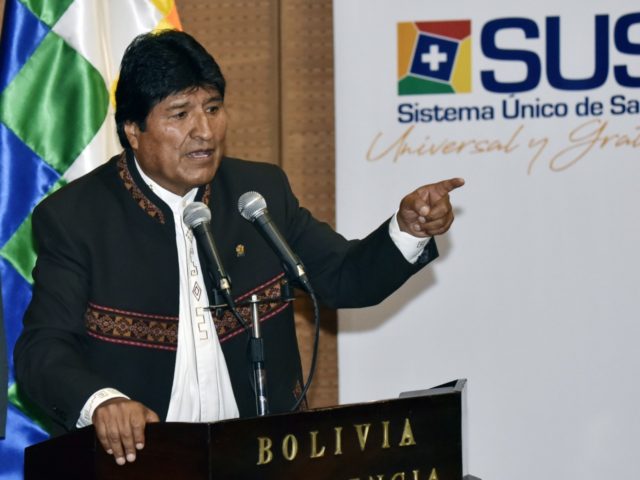Turkish President Recep Tayyip Erdogan welcomed leftist Bolivian counterpart Evo Morales to Ankara for official talks Tuesday. Morales expressed hope that his country could expand cooperating with the Turkish military.
Morales attended an event upon arrival hosted by Ankara University alongside Turkish Education Minister Ziya Selçuk, Bolivian Foreign Minister Diego Pary, Ankara University rector Erkan Ibiş, and other officials.
According to the pro-government newspaper Sabah, Morales “expressed his wish that the number of Bolivian students at the university would increase and that Turkish-Bolivian relations would continue to grow.”
The Bolivian leader then went to the Presidential Complex to meet with Erdogan and partake in an official greeting ceremony. The two men held talks behind closed doors and later discussed their meeting with reporters. Morales said he hoped to court Erdogan’s support in the area of defense.
“We need cooperation in the defense field, especially to combat smuggling,” he said. “We want the transfer and purchase of technology cooperating with the army, and we need it.”
President @RT_Erdogan met with President Evo Morales Ayma of the Plurinational State of Bolivia at the Presidential Complex.https://t.co/uqV3qotYEG pic.twitter.com/DKbIDJEbIW
— Turkish Presidency Directorate of Communications (@Communications) April 9, 2019
Erdogan personally invited Morales to Turkey, according to the Turkish Presidential Communications Directorate, marking the first-ever presidential visit from Bolivia to Turkey. In his remarks, Erdogan thanked Morales for his vehement anti-Israel stance and support for the Palestinian state.
“I want to thank Bolivia for its support for Palestine’s cause, especially for Jerusalem’s status and protection of the Palestinian civilians,” Erdogan said in his remarks.
Erdogan’s desire to form a relationship with Morales serves as a further indication of his fondness for Latin America’s far-left authoritarian regimes despite having once run for office in Turkey as a free-market, center-right Islamist politician. The Turkish leader has already developed strong ties to the Maduro regime in Venezuela and appears to be expanding that relationship to Maduro allies.
In January, Erdogan warned the United States against trying to instigate a transition to democracy in crisis-stricken Venezuela, urging Maduro to “stand tall” against attempts to oust him by recognizing opposition leader Juan Guaidó as the country’s rightful president. Morales echoed that statement, as a vital regional ally to the Maduro regime connected by their socialist and anti-imperialist ideology.
“Appointing presidents today was like the appointment of governors during the colonization era,” he said. “I very well know the Venezuelan state, its government, and people … It is a country that defends its independence and sovereignty despite the fiscal troubles. That’s why we support them.”
The two men also share the responsibility of heading up regimes responsible for serious human rights violations. Last year, Turkey imprisoned the largest number of journalists worldwide, also arresting dozens of political and human rights activists. The 2018 Turkish presidential election featured a popular candidate forced to campaign behind bars, the Democratic Peoples’ Party (HDP) leader Selahattin Demirtas. According to Amnesty International, cases of torture continued to be reported, but in lower numbers than in the aftermath of the failed military coup attempt in July 2016.
Human rights violations in Bolivia remain largely unreported by the media, who remain more focused on the supposed success of Morales’s leftist agenda. “Impunity for violent crime and human rights violations remains a serious problem in Bolivia,” notes Human Rights Watch in its 2018 World report. “The administration of President Evo Morales has created a hostile environment for human rights defenders that undermine their ability to work independently.”
“Despite recent legal reforms, extensive use of pretrial detention—combined with trial delays—undermine defendants’ rights and contribute to prison overcrowding,” they continue. “Threats to judicial independence, violence against women, and child labor are other major concerns.”
Follow Ben Kew on Facebook, Twitter at @ben_kew, or email him at bkew@breitbart.com.

COMMENTS
Please let us know if you're having issues with commenting.